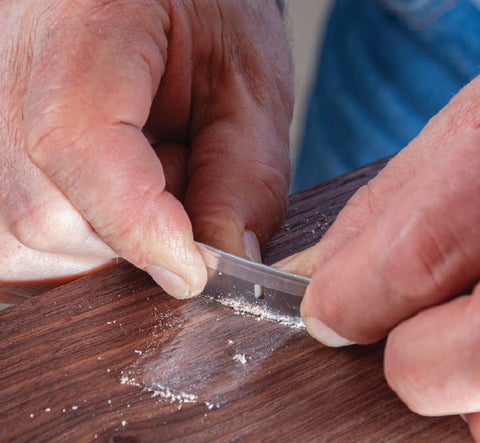
Q: I was using plastic pyramid risers to support a large walnut tabletop that I was varnishing, when I accidentally shifted the panel a few inches. After turning it back over, I noticed a narrow, shallow scar near each corner created by the pyramid tips pressing into the finished surface. I’m heartsick. Is there any way to fix these, short of sanding down and refinishing the areas?
Mack Berger
Phoenix, Arizona

A: I feel your pain. I’ve found that such pyramids are fine for smaller work, but not heavy stuff. However, take heart; you can probably fix the damage fairly easily using a modified version of the old “wet cloth-and-iron” trick used to repair dings on raw wood. The technique works great on solvent-based finishes; I haven’t tried it on water-based products.
The first order of business is to perforate the finish at the scar as shown. Don’t overdo it: just barely break through the finish layer, and don’t make too many slits at first. Try to mimic the spacing of the adjacent wood pores if possible.
Next, lay a wet strip of cloth such as a cotton T-shirt hem over the scar and let it sit for 5 or 10 minutes. Then steam the area with a wood burning tool. Afterward, inspect the scar to see if it has filled out. If not, repeat the water and heat applications until the affected area has swollen slightly above the adjacent surface. If necessary, poke more slits. Then let the water completely evaporate from the uncovered scar.
Finally, scrape the raised area with a razor blade to level it, then follow up by sanding the area with 400-grit paper. After applying varnish, the completed repair should be barely discernable, if at all.


Scrape. Flex a brand new single-edged razor blade as you would a card scraper, and scrape the swollen scar to level it out.
